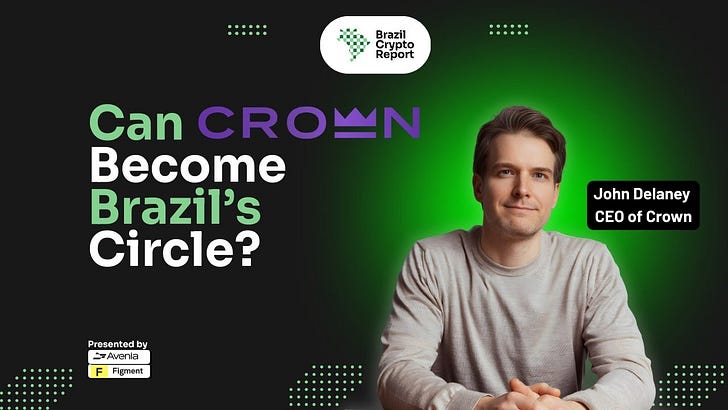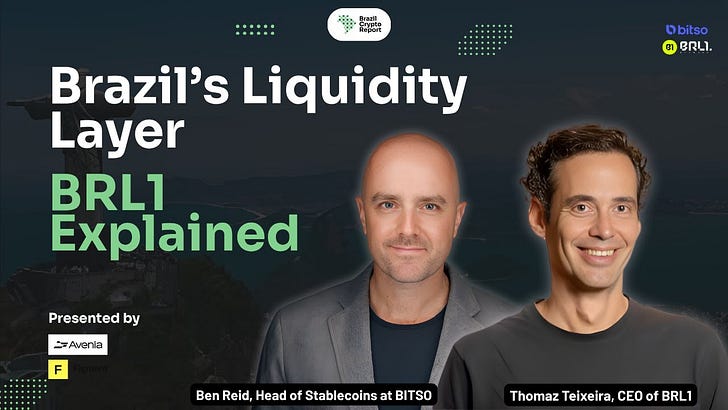🙌 You can listen to BCR on your favorite podcast platform YouTube | Spotify | Apple Podcasts
🔥 Join the BCR English language Telegram group to continue the conversation
Olá pessoal!
Today’s episode is with Thamilla Talarico, head of on-chain finance growth for Brazil at Polygon Labs. You may recall that she previously represented Ernst & Young in the Central Bank’s Drex pilot.
We talk about Polygon’s deliberate investment in Brazilian market expansion, recognizing the country's unique position in the Latin American digital asset ecosystem.
We also dive into several important changes to Polygon’s growth strategy. Gone are the days when Starbucks and Nike were issuing NFTs on the platform. Nowadays, they are laser focused on payments and on-chain finance (RWAs).
Thamilla also reflects at length about her experience working on the Drex pilot with EY. We explore about the good, bad and ugly aspects of the project, and how, ultimately blockchain privacy technology is just not ready to be deployed at the scale required by the Central Bank.
Key Takeaways Regarding Polygon’s Pivot
Laser-focused vision: Polygon has shifted from being a general-purpose blockchain to specifically targeting real-world assets and payments, moving away from the scattered approach that previously included NFT partnerships and various enterprise initiatives
Market dominance in BRL stablecoins: Brazilian Real stablecoins represent the second-largest non-USD stablecoin volume on Polygon, with major issuers including BRL1 (Bitso, Mercado Bitcoin, Foxbit consortium), BRLA (Avenia), and BRZ (Transfero)
Technical infrastructure improvements: The Giga gas roadmap promises significant performance enhancements, scaling from 1,000 TPS currently to 5,000 TPS by October 2024, with eventual targets of 100,000 TPS
Geographic expansion strategy: Brazil represents one of four key markets receiving dedicated business development resources, alongside Hong Kong, India, and the UK
Drex Project Reflections and Market Implications
Privacy vs. composability trade-offs: The fundamental challenge wasn't scalability, but rather balancing blockchain's inherent transparency with privacy requirements and regulatory compliance under Brazilian data protection laws
Technical maturity gaps: None of the three privacy solutions tested in Phase One met the Central Bank's production-ready standards, highlighting the nascent state of enterprise-grade privacy technologies
Regulatory complexity: The Central Bank struggled to reconcile blockchain's transparency with compliance requirements, particularly around data protection and the balance between audit capabilities and broad surveillance powers
Positive externalities: Despite the pivot, the project successfully matured Brazil's digital assets ecosystem, creating technical expertise, fostering collaboration between competitors, and establishing business relationships that will continue beyond Drex
Moving forward, Thamilla emphasizes that the infrastructure, knowledge, and business cases developed during the Drex pilot remain valuable.
The focus should shift toward private sector initiatives using stablecoins as settlement instruments for tokenized assets, leveraging the collaborative frameworks and technical expertise developed during the pilot program.
The Central Bank's decision represents a natural transition from public sector experimentation to private sector implementation, she argues, positioning Brazil to maintain its leadership in tokenization while building on the substantial groundwork laid by the Drex initiative.
You can connect with Thamilla on Linkedin.
Have a great week everyone,
-AWS
Brazil Crypto Report is presented by
Avenia is the programmable financial infrastructure for Latin America. Connect to local payment rails like PIX, SPEI and CBU — using stablecoins as settlement — and unlock real-time, cross-border payments without banks, FX desks, or SWIFT.
Whether you're building a wallet, a crypto card, or a global treasury solution, Avenia gives you the APIs and compliance-ready infrastructure to scale in LatAm. Move money between BRL, USD, MXN and more — fast, transparent, and fully on-chain.
P2P.me is the fastest way to buy and sell crypto in Brazil using Pix: direct, secure, and fully onchain.
Backed by Multicoin and Coinbase Ventures, P2P.me offers a compliant on and off ramp with, ZK-KYC, and no hidden fees.
You can easily use P2P.me to pay PIX QR codes in Brazil using your USDc balance. Topup, scan and pay.
Visit br.p2p.me to get started and earn $50 per operation limit.












